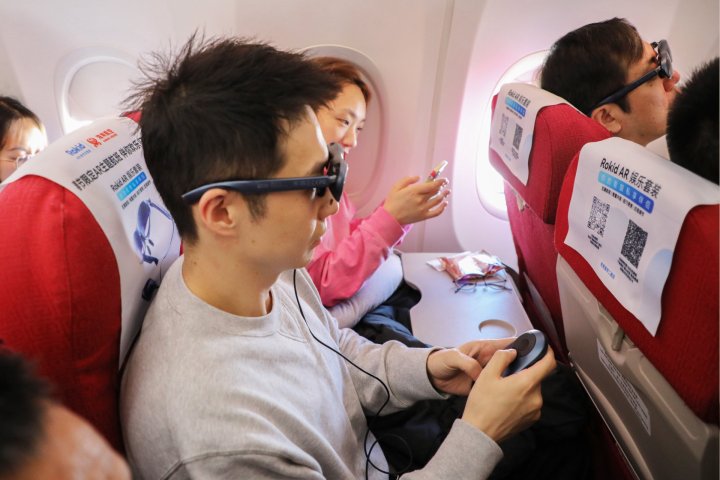
Sick of those tiny seatback screens on long flights? Thanks to a new partnership between Rokid and Hainan Airlines, that could become a thing of the past. Instead of small, glare-streaked LCDs, you could be enjoying a giant virtual display when you don futuristic smart glasses while flying.
China’s Hainan Airlines loaned pairs of Rokid Entertainment Kits to passengers of flight HU7874 on February 7, 2024, which made it the world’s first AR flight according to the Rokid press release. The technology isn’t new, but this partnership could be the beginning of a change for in-flight movies and games.
Upgrading a fleet of aircraft with thousands of small, built-in screens and entertainment systems can be very expensive and time-consuming. By comparison, Rokid Entertainment Kits provide an instant upgrade to massive displays and offer a much wider selection of in-flight content for any airplane.
The AR package included Rokid Max smart glasses and a Rokid Station preloaded with several 3D movies that can be viewed without an internet connection. I found the combination of Rokid Max and Rokid Station to be a great solution for content consumption.

Rokid Station is an Android TV device that can connect to a variety of streaming services, play downloaded videos, and also run games and apps. It includes a battery that can power the Rokid Max smart glasses for several hours.
By providing both devices to passengers, Hainan Airlines gave each person a private cinema experience to help pass the time on the two- to three-hour flight from Shenzhen to Xi’an. Since the Rokid Max includes a diopter adjustment, the smart glasses will work for most people, even if they wear prescription lenses.
It would be great to see a similar feature come to U.S. airlines. There’s also a chance AR glasses could be paving the way to windowless passenger airplanes, which would reduce noise, improve efficiency, and make the aircraft more durable.
Editors’ Recommendations




